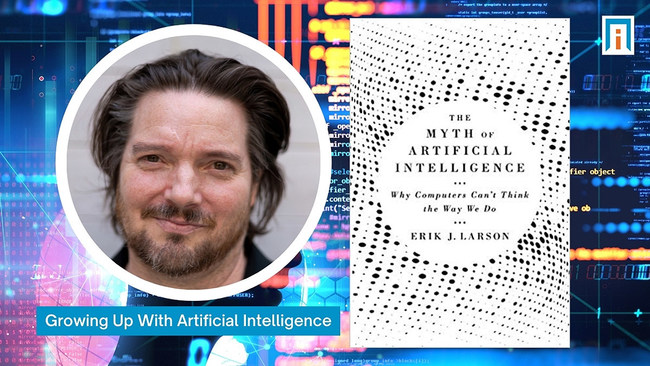FORT WORTH, Texas, May 13, 2021 /PRNewswire/ — If the dystopian alarm of the news is any indication, the robot apocalypse will soon be upon us.
Not so fast, says author and computer scientist Erik Larson, Ph.D. In his latest book, The Myth of Artificial Intelligence: Why Computers Can’t Think the Way We Do, he notes that perhaps the replacement of human beings with artificial intelligence and “thinking machines” is not as imminent as we fear.
Inflection, the opinion, editorial, and news analysis journal of AcademicInfluence.com features Larson’s first-hand insights from his latest book:
Growing Up with Artificial Intelligence
“I figured that readers should know about the difference between commercial and practical AI as well as the sort of general intelligence that futurists insist will soon emerge, from steady progress in practical and commercial applications all the way up to the development of ‘true,’ or general, AI,” says Larson.
“The key point is devastating: there isn’t a path from one to the other, or what’s called narrow (usable) AI to general intelligence. General AI may still be possible, of course, but we can’t get there riding a wave of machine learning, or for that matter any of the other traditional methods that we’ve retired.”
Larson is critical of fanciful tech companies and prominent futurists for hyping their own artificial intelligence initiatives and their ungrounded forecasts of an AI-dominated future. These projects often arrive with much acclaim and then quietly fade from view, notes Larson.
“There’s actually a question mark at the center of AI; the futurists’ claims are based on a kind of wishful thinking that this isn’t so. Futurism and hype about AI, in other words, is a misrepresentation of facts that demands response,” Larson states.
In addition to his article, Larson shared further insight into the state of machine learning and artificial intelligence in interviews with Dr. Jed Macosko, academic director of AcademicInfluence.com and professor of physics at Wake Forest University, and his daughter Karina, AcademicInfluence.com’s student correspondent:
What the Future Holds for Artificial Intelligence [VIDEO]
The Inspiration for Academic Influence [VIDEO]
“Dr. Larson helps us make sense of the promise of ‘thinking machines’ and what such devices can and cannot do. At a time when news media over-promote technology and inadvertently stoke fear of the future, it’s good to get a more balanced view of where AI technology is heading from an expert and a long-time industry insider,” says Dr. Macosko.
Erik Larson, Ph.D., a member of the Academic Advisory Board of AcademicInfluence.com, is a computer scientist, entrepreneur, and technologist with over a decade of experience in software development and R&D in the computational sciences. Larson’s projects focus on the design and development of software systems that provide effective solutions to real-world problems. As a scientist, his interests lie in hybrid systems that utilize knowledge representation and reasoning, together with modern data-centered and machine-learning approaches. His career has spanned both classic and empirical AI, with a particular focus on text analytics (information extraction and natural language processing).
AcademicInfluence.com is the preeminent technology-driven rankings site dedicated to students, researchers, and inquirers from high school through college and beyond, offering resources that connect learners to leaders. For details on this technology and the people behind it, visit the AcademicInfluence.com About page. AcademicInfluence.com is a part of the EducationAccess group, a family of sites dedicated to lifelong learning and personal growth.
Contact:
Jed Macosko, Ph.D.
Academic Director
AcademicInfluence.com
309860@email4pr.com
(682) 302-4945
SOURCE AcademicInfluence.com


